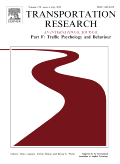
TRANSPORTATION RESEARCH PART F-TRAFFIC PSYCHOLOGY AND BEHAVIOUR
Scope & Guideline
Unraveling Human Behavior in Transportation Dynamics
Introduction
Aims and Scopes
- Traffic Safety and Human Behavior:
The journal emphasizes research on the psychological factors that impact driver behavior, including risk perception, decision-making in critical situations, and responses to automated vehicle technologies. - Interaction between Drivers and Automated Systems:
A key focus is on how drivers interact with automated vehicles and driver assistance systems, exploring factors that influence trust, acceptance, and the transition between manual and automated driving. - Vulnerable Road Users:
Research on the behavior and safety of vulnerable road users such as pedestrians, cyclists, and motorcyclists is prominent, highlighting their interactions with vehicles and the impact of infrastructure on their safety. - Cognitive and Emotional Factors in Driving:
The journal investigates how cognitive load, emotional states, and individual differences affect driving performance and risk-taking behavior, providing insights into driver distraction and fatigue. - Sustainable Transportation:
There is a growing interest in understanding the psychological and behavioral aspects of sustainable transportation choices, including public transport use, cycling, and the adoption of electric vehicles. - Socio-Cultural Influences on Driving Behavior:
Research includes the influence of cultural, social, and demographic factors on driving behavior, safety perceptions, and the acceptance of new transportation technologies.
Trending and Emerging
- Impact of Automation on Driver Behavior:
There is a significant rise in research exploring how automation affects driver behavior, focusing on trust, takeover performance, and the psychological implications of transitioning between automated and manual control. - Psychological Factors in Vulnerable Road User Safety:
Increased attention is being paid to the safety and behavior of vulnerable road users, with studies examining interactions between pedestrians, cyclists, and automated vehicles in urban environments. - Mental Health and Driving:
Emerging research explores the intersection of mental health and driving behavior, including the effects of anxiety, stress, and cognitive load on driving performance and decision-making. - Gamification and Behavioral Interventions:
The use of gamification and other innovative behavioral interventions to promote safe driving practices and encourage sustainable transportation choices is gaining traction. - Sustainability and Eco-Driving:
There is a growing interest in understanding the psychological aspects of eco-driving and sustainable transportation behaviors, reflecting broader societal concerns about climate change. - User Experience with Transportation Technologies:
Research focusing on user experiences with new transportation technologies, including automated vehicles and driver assistance systems, is increasingly prevalent, emphasizing user acceptance and interaction design.
Declining or Waning
- Traditional Traffic Engineering Solutions:
Research focusing solely on traditional traffic engineering methods without considering psychological or behavioral insights has decreased, as the field increasingly emphasizes human factors. - Static Safety Interventions:
There is a noticeable decline in studies centered on static safety measures (like speed bumps or signage) without integrating behavioral insights or technological advancements in traffic management. - Generalized Risk Perception Studies:
The focus on generalized studies of risk perception without specific contextual applications (like automated vehicles or specific demographics) is less frequent, as the field moves towards more nuanced analyses. - Single-Factor Explanations for Driving Behavior:
Research that relies on single-factor explanations for driving behavior (e.g., solely focusing on demographics) is waning, with a shift towards more complex, multifactorial approaches that consider psychological, social, and environmental influences.
Similar Journals
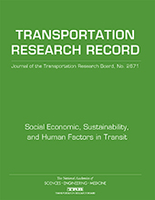
TRANSPORTATION RESEARCH RECORD
Exploring the Future of Transportation SystemsTRANSPORTATION RESEARCH RECORD is a premier journal published by SAGE PUBLICATIONS INC, focusing on the latest advancements and research in the fields of civil and structural engineering as well as mechanical engineering. Since its inception in 1974, this journal has become an essential platform for disseminating innovative methodologies, case studies, and comprehensive reviews that address critical issues in transportation systems and infrastructure. With a respectable Q2 ranking in both engineering categories as of 2023, it solidifies its position among reputable publications, catering to a diverse range of scholars, professionals, and students. The journal not only facilitates access to high-quality research but also plays a pivotal role in shaping policy and practice through its robust findings. For those invested in the engineering disciplines, particularly within the transportation domain, TRANSPORTATION RESEARCH RECORD is an invaluable resource, with a wide array of topics covered throughout converged years, from 1974 to 1990, and from 1993 to 2024, ensuring a comprehensive exploration of historical and contemporary challenges in transportation.

Journal of Transportation Engineering Part A-Systems
Pioneering Research for Efficient and Sustainable InfrastructureThe Journal of Transportation Engineering Part A-Systems, published by the American Society of Civil Engineers (ASCE), is a cutting-edge, peer-reviewed journal dedicated to the advancement of knowledge in the field of transportation systems. With an ISSN of 2473-2907 and an E-ISSN of 2473-2893, this journal serves as a crucial resource for researchers, professionals, and students interested in the intricate interplay between civil engineering and transportation networks. Boasting a Q2 ranking in both the Civil and Structural Engineering and Transportation categories, this journal reflects the high-quality research contributing to these vital disciplines. Accessible through open-access options, the journal provides a platform for innovative ideas and research findings from 2017 to 2024, aiming to address contemporary challenges in transportation systems while fostering interdisciplinary collaboration. As an essential outlet for scholarly work in the United States and beyond, the Journal of Transportation Engineering Part A-Systems is committed to enhancing the understanding of complex transportation dynamics and the development of sustainable and efficient infrastructures.
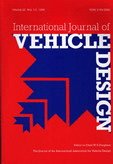
INTERNATIONAL JOURNAL OF VEHICLE DESIGN
Driving Innovation in Vehicle DesignThe INTERNATIONAL JOURNAL OF VEHICLE DESIGN is a distinguished publication that has been at the forefront of automotive engineering and mechanical design since its inception in 1979. Published by INDERSCIENCE ENTERPRISES LTD in the United Kingdom, this journal aims to foster innovative research and technical knowledge in the field of vehicle design, encompassing various aspects from conceptualization to manufacturing and performance analysis. With an ISSN of 0143-3369 and an E-ISSN of 1741-5314, the journal extends its accessibility to a global audience, although it currently does not operate under an open access model. Recognized for its scholarly contributions, it holds a Q3 ranking in Automotive Engineering and a Q4 ranking in Mechanical Engineering as of 2023, reflecting its position among peers with an increasing impact in the discipline. Researchers, professionals, and students will find valuable insights and cutting-edge research in the articles published, contributing to a deeper understanding of advancing vehicle technologies and methodologies. For inquiries, the journal is based at the World Trade Center Building, 29 Route de Pré-Bois, Case Postale 856, CH-1215 Geneva, Switzerland, where one can also follow its developments and contribution to the growing body of knowledge in vehicle design.
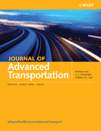
JOURNAL OF ADVANCED TRANSPORTATION
Connecting Disciplines to Shape Transportation's FutureJOURNAL OF ADVANCED TRANSPORTATION, published by WILEY-HINDAWI, stands as a pivotal platform in the fields of automotive engineering, computer science applications, economics, mechanical engineering, and strategy and management. With an impressive impact factor and positioned in the Q2 quartile across multiple categories as of 2023, this open-access journal offers researchers, professionals, and students unparalleled opportunities to disseminate and access cutting-edge research. Operating under an open access model since 2017, the journal fosters global collaboration and knowledge exchange, encouraging innovative solutions to contemporary transportation challenges. Its comprehensive scope, spanning converged years from 1979 to 2024, reflects its commitment to addressing the evolving landscape of transport systems worldwide. Researchers from diverse disciplines are invited to contribute transformative studies that advance the field and inspire future endeavors.
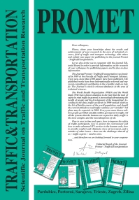
Promet-Traffic & Transportation
Exploring Interdisciplinary Insights in Traffic EngineeringPromet-Traffic & Transportation is a premier open-access journal published by SVEUCILISTE U ZAGREBU, FAKULTET PROMETNIH ZNANOSTI, dedicated to advancing the fields of traffic and transportation engineering. Since its inception in 2001, the journal has played a crucial role in disseminating innovative research and best practices within its scope, which embraces civil and structural engineering, urban studies, and various engineering disciplines. With a Q3 ranking in multiple categories as of 2023, including Civil and Structural Engineering and Ocean Engineering, Promet is positioned to provide valuable insights into contemporary challenges and solutions in transportation systems. Open-access since 2013, the journal ensures that all published articles are freely available to researchers, practitioners, and students globally, fostering a collaborative environment for knowledge exchange. Based in Croatia, it serves as an essential platform for interdisciplinary studies that influence the future of traffic and transportation policies and practices.
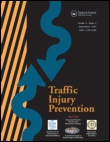
Traffic Injury Prevention
Transforming research into impactful safety practices.Traffic Injury Prevention is a premier academic journal dedicated to disseminating critical research and innovative findings in the field of injury prevention, with a particular focus on traffic-related incidents. Published by Taylor & Francis Inc, this journal serves as a vital platform for communication among researchers, policymakers, and practitioners in public health, safety research, and environmental health. With an impressive impact factor and a robust ranking—earning a place in the Q2 quartile for Public Health, Environmental and Occupational Health, and Q1 for Safety Research—it reflects the journal's significant contributions to advancing knowledge and practice in reducing traffic injuries and fatalities. Since its inception in 2002, Traffic Injury Prevention has highlighted pivotal studies and interventions that inform best practices, encouraging a safer environment for all road users. The journal is essential reading for anyone involved in traffic safety, from researchers and public health officials to educators and students. As we look towards the future, contributions to this journal not only inform current practices but also shape ongoing research, policy, and education aimed at preventing traffic injuries worldwide.
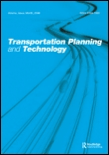
TRANSPORTATION PLANNING AND TECHNOLOGY
Enhancing Connectivity with Groundbreaking ResearchTransportation Planning and Technology is a prestigious academic journal dedicated to advancing the fields of transportation planning and technology. Published by Taylor & Francis Ltd, this journal serves as a critical platform for disseminating high-quality research and innovative practices in the context of urban and regional transportation systems. With an ISSN of 0308-1060 and an E-ISSN of 1029-0354, the journal has established a significant foothold since its inception in 1972, spanning through to 2024. Recognized in the Q2 category of Geography, Planning and Development and the Q3 category of Transportation in the 2023 rankings, it reflects a solid impact factor supported by its Scopus classifications, holding a rank of #270/821 in Geography, Planning and Development and #72/141 in Transportation. Researchers, professionals, and students alike benefit from the journal's comprehensive scope, which encompasses theoretical aspects, practical applications, and policy implications related to transportation systems. As an essential resource in the field, it invites contributions that enhance our understanding of the complexities in transportation planning, making it a must-read for those engaged in related studies.
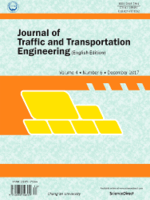
Journal of Traffic and Transportation Engineering-English Edition
Elevating Standards in Traffic and Transportation Research.Journal of Traffic and Transportation Engineering-English Edition, published by KEAI PUBLISHING LTD, is a leading open-access journal that has been disseminating valuable research in the realms of civil and structural engineering, as well as transportation studies since 2014. With a robust impact factor reflected by its prestigious Q1 rankings in both Civil and Structural Engineering and Transportation, this journal stands at the forefront of innovation and scholarship, featuring contributions from experts across the globe. The journal is particularly noted for its practical and theoretical advancements in traffic and transportation engineering, making it indispensable for researchers, industry professionals, and students aiming to deepen their understanding of these critical fields. Dedicated to providing a platform for high-quality interdisciplinary research, the Journal of Traffic and Transportation Engineering embraces the principles of open access, ensuring that all published articles are freely available to foster knowledge sharing and collaboration within the community. With its headquarters located in Beijing, China, the journal continues to push boundaries and set new standards in the field of traffic and transportation research.
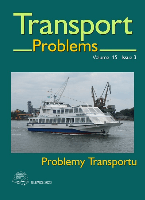
Transport Problems
Unlocking Insights in Transportation Systems and TechnologiesTransport Problems, published by the Silesian University of Technology, Faculty of Transport, is a distinguished open-access journal that has been advancing scholarship in the fields of Automotive Engineering, Mechanical Engineering, and Transportation since its inception in 2007. With an ISSN of 1896-0596 and an E-ISSN of 2300-861X, this journal serves as a vital platform for researchers and practitioners to disseminate innovative research findings and explore fundamental issues in transport systems and technologies. Based in Poland, the journal covers various topics including transportation logistics, vehicle dynamics, and environmental impacts, thereby addressing critical challenges faced in the transportation sector globally. As reflected in its Scopus rankings, the journal occupies respectable quartiles and continues to contribute valuable insights to the academic community. By making its content freely accessible, Transport Problems significantly enhances the ability of researchers and students alike to engage with the latest developments in transport engineering and contribute to this ever-evolving field.

Baltic Journal of Road and Bridge Engineering
Advancing Infrastructure: Bridging Ideas and InnovationThe Baltic Journal of Road and Bridge Engineering, published by RIGA TECHNICAL UNIV-RTU, serves as a pivotal platform for disseminating cutting-edge research in the fields of building and construction as well as civil and structural engineering. Established as an Open Access journal since 2006, it fosters global collaboration and accessibility to critical engineering knowledge, facilitating the exchange of innovative ideas among researchers, professionals, and students. With a commendable impact factor and recognition in Scopus rankings, where it stands in the third quartile for both relevant engineering categories, the journal underscores its significance in advancing the discipline. The journal aims to publish high-quality, peer-reviewed articles that address contemporary challenges in road and bridge engineering, making it an essential resource for anyone involved in infrastructure development and research. Located in Lithuania at 6B Kipsalas Street, RIGA LV-1658, this journal not only highlights the latest advancements but also seeks to inspire future innovations in engineering practices.